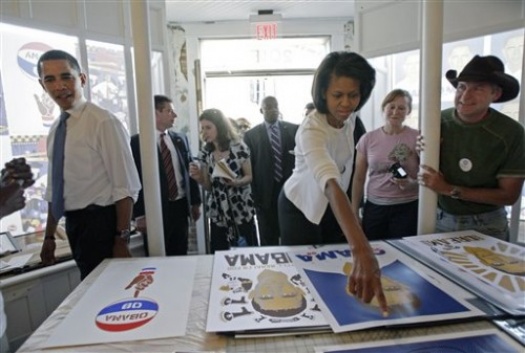
WASHINGTON (AP) _ Race again played a pivotal role in Tuesday’s Democratic presidential clashes, as whites in Indiana and North Carolina leaned solidly toward Hillary Rodham Clinton and blacks voted overwhelmingly for Barack Obama, exit polls showed. Almost half said they were influenced by the focus on Obama’s former pastor, the Rev. Jeremiah Wright.
Obama, the Illinois senator battling to become the first black president, again failed to gain ground with a crucial voting bloc that has consistently eluded him ù working-class whites. But he pieced together coalitions that besides blacks included the young, first-time primary voters, the very liberal and college graduates, plus sizable minorities of whites.
According to exit polls of voters, about two-thirds of whites in both states who have not completed college were supporting Clinton. The New York senator could use that to fortify her argument that she would be the stronger Democratic candidate in the November general election. Of 28 states that held primaries in which she and Obama competed before Tuesday, Clinton had prevailed with working-class white voters in 25.
Wright was a looming factor in the voting, with nearly half in each state saying he was important in choosing a candidate. Of that group, seven in 10 in Indiana and six in 10 in North Carolina backed Clinton.
Those saying Wright did not influence them heavily favored Obama. In North Carolina, Obama got more votes from people saying they discounted the Wright episode than Clinton got from those affected by it, while in Indiana the two groups were about equal in size.
Among whites, eight in 10 in both states who said Wright affected their choice went with Clinton. That was well above the six in 10 whites overall who supported her.
In both states, two-thirds of Clinton’s white voters said Wright was important. That compared to eight in 10 white Obama supporters who said Wright was not a factor.
Wright has said the U.S. government may have developed the AIDS virus to infect blacks and that the U.S. invited the Sept. 11 terrorist attacks. Obama denounced the remarks last week.
The six in 10 whites in both states supporting Clinton were similar to her margin over Obama among whites nationally so far, showing he continues to have trouble cutting into her support from those voters. Even so, his lopsided backing from blacks meant he didn’t need white majorities Tuesday to be competitive.
The two rivals have been trying to win over top Democratic officials, the superdelegates, who may decide who gets the party’s nomination. Clinton has argued that her strength with this group makes her the stronger candidate for the fall campaign. Obama’s campaign says he will do well with those voters in November once he contrasts himself with Republican John McCain.
Nine in 10 blacks in both states were backing Obama ù an even stronger margin than usual for a group he has dominated. That proved decisive in North Carolina, where they comprised about a third of voters ù nearly double their proportion in Indiana.
In another troubling sign for Obama, independents did not lean toward him as usual in either state.
Though Clinton won once again among Catholics in Indiana, she and Obama divided them about equally in North Carolina. Obama also had an edge in both states among first-time primary voters, underscoring his continued ability to draw new voters to the polls.
North Carolina was clearly Obama’s stronger state. He won there among young voters, college graduates and those earning more than $100,000 a year.
Clinton gave a better performance in Indiana.
She won handily among white men, a group she and Obama have split about evenly but whom she won easily in Pennsylvania and Ohio. She and Obama about equally divided the votes of people earning at least $100,000 a year, who usually have leaned toward Obama.
In both states, whites who said race was an important factor were favoring Clinton, as they have before. Older voters were also solidly behind her as usual.
Voters in both states overwhelmingly named the economy as the nation’s top issue. While voters most concerned about the economy and who said they were affected by it were evenly divided in Indiana, they supported Obama in North Carolina.
In the latest evidence of bitter feelings between the two camps, just under half of Clinton’s supporters in both states said they would support Obama against McCain in November. Seven in 10 Obama backers in North Carolina, and slightly fewer in Indiana, would back a Clinton candidacy. Analysts expect those heated feelings to wane once the party finally chooses its candidate.
The results were from exit polling by Edison Media Research and Mitofsky International for The Associated Press and television networks conducted in 35 precincts in each state.
The data was based on 1,881 people voting in Indiana’s Democratic contest and 2,316 in North Carolina, with a margin of sampling error of plus or minus 3 percentage points for both states.
______ Copyright 2008 Associated Press. All rights reserved. This material may not be published, broadcast, rewritten, or redistributed.

